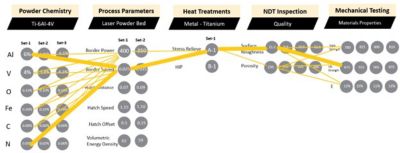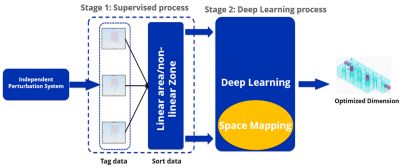-
-
学生向け無料ソフトウェアにアクセス
Ansysは次世代の技術者を支援します
学生は、世界クラスのシミュレーションソフトウェアに無料でアクセスできます。
-
今すぐAnsysに接続!
未来をデザインする
Ansysに接続して、シミュレーションが次のブレークスルーにどのように貢献できるかを確認してください。
国および地域
無料トライアル
製品およびサービス
リソースとトレーニング
当社について
Back
製品およびサービス

現在、多くの業界で、新しい設計の品質評価にシミュレーションが活用されています。シミュレーションツールが登場するまでは、物理的なプロトタイプを作製して、実際の運用環境で設計をテストしていました。シミュレーションツールを使用することで、新しい設計をより迅速かつ簡単に解析できるようになり、実機試験の必要性が減りました。イノベーションの実現は、いかに新しいアイデアを試すことができるかにかかっています。エンジニアが検討できる設計が多いほど、既存の設計よりもさらに優れた性能を達成できる設計を見つけることができます。
理想的なシミュレーションツールとは、製品の定義とその動作条件に基づいて、作成した設計の性能を即座に、かつ正確に予測するツールです。現時点では、そのような理想的なツールはまだ実現されていませんが、多くのシミュレーションツールはその実現に向けて進化し続けています。これまで長年にわたり、シミュレーションツールは設定方法、実行速度、精度の向上などの改善が繰り返されてきました。
近年では、人工知能(AI)として知られる数学的手法により、理想的な解析手法に大きく近づく進歩が見られます。Ansysのツールも、多くの高度な機能がAIによって強化されています。Ansysでは、こうした高度な機能を専用のAI+モジュールとして分離させました。そうすることで、ユーザーは、所有しているすべてのライセンスパッケージで、AI機能を利用できるようになりました。また、高度な機能の操作に慣れていない場合は、製品内でAI機能を無効にすることもできます。つまり、AI+オプションを使用することで、ユーザーは、最新かつ最高のAI機能を使用できるようになります。
現在提供されているAnsysのモジュールは以下の7つです。
- CFD AI+
- SynMatrix AI+
- optiSLang AI+
- Structures AI+
- Granta MI AI+
- Electronics AI+
- Missions AI+
CFD AI+
Ansys CFD AI+モジュールを使用すると、これまではよりコストのかかる非定常シミュレーションでのみ可能であった流体の振る舞いを、定常シミュレーションで予測できるようになります。非定常シミュレーションのリファレンス結果に基づいてAnsys Fluentの乱流モデルを微調整することで、はるかに少ない計算リソースで、忠実度を高めながら、低コストの定常シミュレーションを実行できます。

Ansys CFD AI+モジュールでは、定常シミュレーションを使用して流体の振る舞いを予測できる。
Granta MI AI+
エンジニアは、Granta MI AI+モジュールを使用することで、材料とプロセスの関係をより深く理解して、材料特性に影響を与える要因についての知見を得ることができます。これにより、既存の材料および製造プロセスパラメータの最適化が可能になり、新しい材料の定義に役立ちます。

Ansys Granta MI AI+では、材料のプロセスと特性の関係についての知見を得ることができる。
Missions AI+
軌道シミュレーションソフトウェアであるAnsys Orbit Determination Tool Kit(ODTK)では、結果として得られる軌道の品質を自動的に評価するためのAIベースツールが提供されます。この品質評価ツールは、Ansys Digital Mission Engineering(DME)のMissions AI+モジュールの一部として提供されます。調整されたモデルとAIアルゴリズムを組み合わせることで、結果のODTK軌道解の品質を正確に評価できるようになります。
optiSLang AI+
optiSLang AI+モジュールでは、サロゲートモデルを作成でき、数値シミュレーションツールよりも迅速に設計の詳細を確認できるようになります。また、AIが作成した設計を調査して、ユーザーに最適な選択肢を示す機能も備えています。エンジニアは、必要な性能特性を指定するだけです。AIを活用したアルゴリズムにより、製品構成の全候補を検討するタスクが実行され、最適なオプションのみが特定および提示されます。
SynMatrix AI+
SynMatrix AI+モジュールは、無線周波数(RF)フィルタの設計にAI技術を活用することで、新しいRFフィルタに最適な構成を見つけるのに役立ちます。

SynMatrix AI+モジュールで無線周波数(RF)フィルタの設計にAIを導入した例
Structures AI+とElectronics AI+
Structures AI+モジュールとElectronics AI+モジュールには、構造シミュレーションソフトウェアであるAnsys Mechanicalと、プリント回路基板(PCB)およびパッケージを解析する電磁界シミュレーションソフトウェアであるAnsys SIwaveでシミュレーションを実行するために必要なコンピューティング能力を予測するためのツールが含まれています。機械学習では、シミュレーションの所要時間(利用可能なリソースに基づく)、必要なメモリ量、そして仮にユーザーがより多くのコンピューティング能力を投入した場合の状況を予測します。この機能は、お客様が実質的に無制限のコンピューティング容量を使用できる、非常に重要な機能です。ユーザーは、クラウドでシミュレーションを一括で実行するには、どの程度のコストがかかるか把握しておくといいでしょう。
上記のAI+機能は、今後実装される機能のごく一部です。Ansysでは、全製品ラインについて、AIを活用して製品をさらに強化するためのアイデアを150個ほど考案しました。現在、最優先事項と位置付けたアイデアをどのように実装していくか検討を進めています。AIの未来には、無限の可能性があります。
Advantageブログ
Ansys Advantageブログでは、専門家が投稿した記事を公開しています。Ansysのシミュレーションが未来のテクノロジーにつながるイノベーションをどのように推進しているかについて最新の情報をご覧ください。


